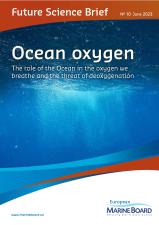
The sentence “every second breath you take comes from the Ocean” is commonly used in Ocean Literacy and science communication to highlight the importance of Ocean oxygen. However, despite its widespread use, it is often not phrased correctly. In contrast, awareness about the threat of the global oxygen loss in the Ocean, called deoxygenation, is low, particularly in comparison with other important stressors, such as Ocean acidification or increasing seawater temperatures.
Deoxygenation is increasing in the coastal and open Ocean, primarily due to human-induced global warming and nutrient run-off from land, and projections show that the Ocean will continue losing oxygen as global warming continues. The consequences of oxygen loss in the Ocean are extensive and include decreased biodiversity, shifts in species distributions, displacement or reduction in fisheries resources, changes in biogeochemical cycling and mass mortalities. Low oxygen conditions also drive other chemical processes which produce greenhouse gases, toxic compounds and further degrade water quality. Degraded water quality directly affects marine ecosystems, but also indirectly impacts ecosystem services supporting local communities, regional economies and tourism. Although there are still gaps in our knowledge, we know enough to be very concerned about the consequences: the impacts might even be larger than from Ocean acidification or heat waves, and three out of the five global mass extinctions were linked to Ocean deoxygenation.
The sense of urgency to improve Ocean health is reflected in the UN Decade of Ocean Science for Sustainable Development and the EU Mission: Restore our Ocean and Waters, and tackling the loss of oxygen in the Ocean is critical to achieving the aims of these two initiatives.
You can find the factsheet for this publication here, see the news item about its launch here, and find out more about the EMB Ocean oxygen Working Group here.
A summary infographic of whether every second breath comes from the Ocean can be found here.
The publication was presented during a dedicated webinar. You can re-watch the recording here and download the PowerPoint slides here.